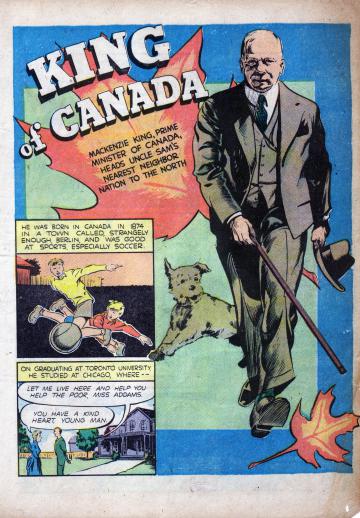Mackenzie King–comic book hero?
It was this that drew me to the Wartime Canada website. Beware all who enter here: you’re going to spend more time than you thought browsing. The website has a wealth of material printed during both the First World War and Second World War, under the headings Eating, Fighting, Learning, Relaxing, Remembering, Returning, Shopping, Volunteering, Working, Worshipping.
Among finds are great speeches and debates of the day, recipe books to help people get the most out of their food rations, records of war-related debates in Parliament and the Senate, brief histories of Canadian troops’ exploits. The following fascinating snippets came from the pamphlet Canada’s War Record for April of 1942.
Canada’s agricultural output grew exponentially as the war continued. In 1942, says the booklet, “there is a vast pool of grain for the Allies.” As much bacon and pork was being shipped in a single week as for the whole year of 1931. It was expected 125 million pounds of cheese would be shipped over in 1942-43; in 1941, 15 million dozen eggs were shipped, compared to a mere million dozen in 1939.
But that same booklet talked about the sacrifice on the home front. “There is no longer both guns and butter,” it says. Non-essential civilian goods were disappearing. Production of domestic cars and trucks had already stopped, the domestic tire supply was projected to dry up shortly, and output of appliances had reduced to a trickle. The government expected to spend $10 million every day—nearly $9 million of which was for the war. Taxes were tripled, taxes on goods and services raised and extended. A minimum tax of 40 per cent was applied to business income and 79.5 per cent of all “excess profits” were taken by the government.
That certainly puts a new slant on the term “war effort” and shows how everybody in the country contributed, even if they weren’t in uniform or defence-related work.
Advertisement













